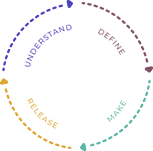Angular JS Development
Angular JS is a robust open-source JavaScript framework maintained by Google, used for building dynamic and single-page web applications (SPAs). It follows an MVC (Model-View-Controller) architecture and extends HTML with powerful features for data binding, dependency injection, and reusable components, making it ideal for building scalable and maintainable applications.
Core Features of Angular JS
1. Two-Way Data Binding
Angular automatically synchronizes data between the model and the view, simplifying the development of interactive UIs.
2. MVC Architecture
Angular separates application logic, data, and presentation using the MVC pattern, which promotes organized and scalable codebases.
3. Dependency Injection
Built-in dependency injection enables better testing, reusability, and maintainability by managing service and component dependencies efficiently.
4. Directives and Custom Components
Angular allows developers to extend HTML with custom directives and components, promoting reusability and modular development.
5. Routing
The Angular Router helps in building SPAs by enabling navigation between views without reloading the page.
Common Use Cases of Angular JS
- Enterprise Web Applications
- Admin Dashboards and CRMs
- Progressive Web Apps (PWAs)
- Real-Time Chat & Collaboration Tools
- E-Commerce and Booking Platforms
Benefits of Angular JS Development
- Highly structured and maintainable code
- Rapid development with reusable components
- Cross-platform support for web, mobile, and desktop
- Large community and strong Google backing
- Strong tooling and support for testing
Future of Angular JS
While Angular JS (1.x) laid the foundation, modern Angular (2+) has evolved into a complete platform with TypeScript, Ivy rendering, and Angular CLI. It continues to thrive in enterprise environments and complex applications due to its scalability, modularity, and performance enhancements.

.jpg)







